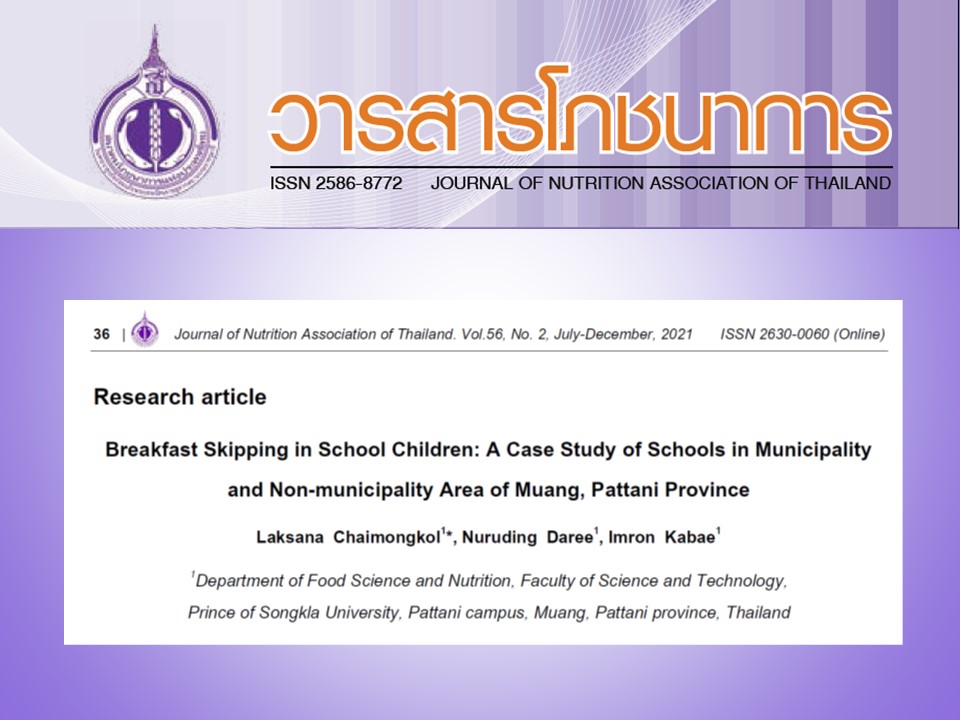Breakfast Skipping in School Children: A Case Study of Schools in Municipality and Non-municipality Area of Muang, Pattani Province
Keywords:
Breakfast skipping, school children, Pattani provinceAbstract
Breakfast is an important meal for school children as it provides energy and nutrients for bodily functions after the overnight fasting. Breakfast skipping is a nutrition-related problem in many countries, including Thailand. This study aimed to assess breakfast skipping practice, nutritional knowledge and attitudes towards eating breakfast, family and individual factors, nutritional status, school performance in relation to breakfast skipping among school-aged children in Muang district of Pattani province. The study was a cross-sectional study. Two hundred and nighty eight students in grades 3-6 from one school in the municipality area and two schools in the non-municipality area were included. Self-administered questionnaires were used to collect child and family characteristics, nutritional knowledge and attitude towards breakfast. Weight and height were measured and nutritional status was determined using Thai growth reference (INMU-ThaiGrowth program). School grades during the last three years were also collected. The results showed that the proportion of students who skipped breakfast (defined as skipping at least one day in 5 school days) were 37.3% and 39.3% for the municipality and non-municipality schools, respectively, with no statistical difference (p > 0.05). Students who skipped breakfast had significantly lower nutrition knowledge (6.4+2.3) than those who did not skipped breakfast (7.1+2.5) (p = 0.014). In addition, attitude scores towards breakfast of the breakfast skippers (10.2+2.9) were significantly lower than those who were non-skippers (12.1+2.9) (p < 0.001). There were no statistically significant differences between breakfast skippers and non-skippers in other factors, including family income, occupation, parental education, family size, sex, age, perception of body image, nutritional status, and school performance. Of note, double burden of malnutrition was observed among school-aged children in this study: 13.8% stunting, 7.8% wasting, and 13.8% overweight/obese. In conclusion, about one third of students in the studied schools skipped breakfast. Breakfast skippers had lower nutrition knowledge and poorer attitude towards eating breakfast. Promoting nutrition knowledge, with emphasis on the importance of breakfast and overall nutritional importance among school-aged children and family should be considered. In addition, nutritional surveillance and other nutrition promotion measures are needed to improve nutritional status of school-aged children.
References
Kobayashi F, Ogata H, Omi N, Nagasaka S, Yamaguchi S, Hibi M and Tokuyama K. Effect of for ex. breakfast skipping on diurnal variation of energy metabolism and blood glucose. Obes Res Clin Pract 2014; 8:e249-e257.
Gail CR, Mark AP, Beverly LG, Judi A, and Jordan DM. Breakfast habits, nutritional status, body weight, and academic performance in children and adolescents. J Am Diet Assoc 2005; 105(5):744-751.
Mahoney CR, Taylor HA, Kanarek RB and Samuel P. Effect of breakfast composition on cognitive processes in elementary school children. Physiol Behav 2005; 85:635-645.
Allirot X, Seyssel K, Saulais L, Roth H, Charrie A, Drai J, et al. Effects of a breakfast spread out over time on the food intake at lunch and the hormonal responses in obese men. Physiol Behav 2014; 127:37-44.
Horikawa C, Kodama S, Yachi Y, Heianza Y, Hirasawa R, Ibe Y, et al. Skipping breakfast and prevalence of overweight and obesity in Asian and Pacific regions: A meta-analysis. Prev Med 2011; 53:260-267.
Shafiee G, Kelishadi R, Qorbani M, Motlagh ME, Taheri M, Ardalan G, et al. Association of breakfast intake with cardiometabolic risk factors. J Pediatr (Rio J) 2013; 89(6):575-582.
Liu J, Hwang WT, Dickerman B and Compher C. Regular breakfast consumption is associated with Increased IQ in kindergarten children. Early Hum Dev 2013; 89:257-262.
กรมอนามัย. ข่าวแจก “เด็กหญิงร้อยละ 50 พลาดอาหารเช้า ย้ำพ่อแม่เตรียมมื้อสำคัญ” [อินเทอร์เน็ต]. นนทบุรี: กรมอนามัย กระทรวงสาธารณสุข; 19 พฤษภาคม 2557 [เข้าถึงเมื่อ 28 สิงหาคม 2564]. เข้าถึงได้จาก: https://wwwold.anamai.moph.go.th/ewt_news.php?nid=6610&filename=index
Pearson N, Biddle SH; Gerely T. Family correlates of breakfast consumption among children and adolescents. Appetite 2009; 52:1-7.
Hallstrom L, Vereecken CA, Ruiz JR, Ptterson E, Gilbert CC, Catasta G, et al. Breakfast habits and factors influencing food choices at breakfast in relation to socio-demographic and family factors among European adolescent. The HELENA Study. Appetite 2011; 56:649-657.
Melby MK and Takeda W. Lifestyle constraints, not inadequate nutrition education, cause gap between breakfast ideals and realities among Japanese in Tokyo. Appetite 2014: 72:37-49.
Dejong CS, Lenthe FJ, Horst K; Oenema A. Environmental and cognitive correlates of adolescent breakfast consumption. Prev Med 2009; 48:372-377.
Affenito SG. Breakfast: a missed opportunity. J Am Diet Assoc 2007;107(4): 565-569.
กรวิกา สุขกระจ่าง. ความรู้ เจตคติและพฤติกรรมการบริโภคอาหารเช้าของนักเรียนชั้นประถมศึกษา ตอนปลาย อำเภอเมือง จังหวัดสงขลา. [วิทยานิพนธ์ศิลปศาสตรมหาบัณฑิต สาขาวิชาพัฒนามนุษย์และสังคม]. สงขลา:มหาวิทยาลัยสงขลานครินทร์; 2551.
สถาบันโภชนาการ.โปรแกรมคำนวณภาวะโภชนาการ INMU-ThaiGrowth. นครปฐม: สถาบันโภชนาการ มหาวิทยาลัยมหิดล. 2552.
Monzani A, Ricotti R, Caputo M, Solito A, Archero F, Bellone S, et al. A systematic review of the association of skipping breakfast with weight and cardiometabolic risk factors in children and adolescents. What should we better investigate in the future? Nutrients 2019:11,387.
Moore GF, Tapper K, Murphy S, Lynch R, Raisanen L, Pimm C, et al. Associations between deprivation, attitudes towards eating breakfast and breakfast eating behaviours in 9-11 year-olds. Public Health Nutr 2007; 10(6):582-589.

Downloads
Published
How to Cite
Issue
Section
License
Upon acceptance of an article, copyright is belonging to the Nutrition Association of Thailand.


